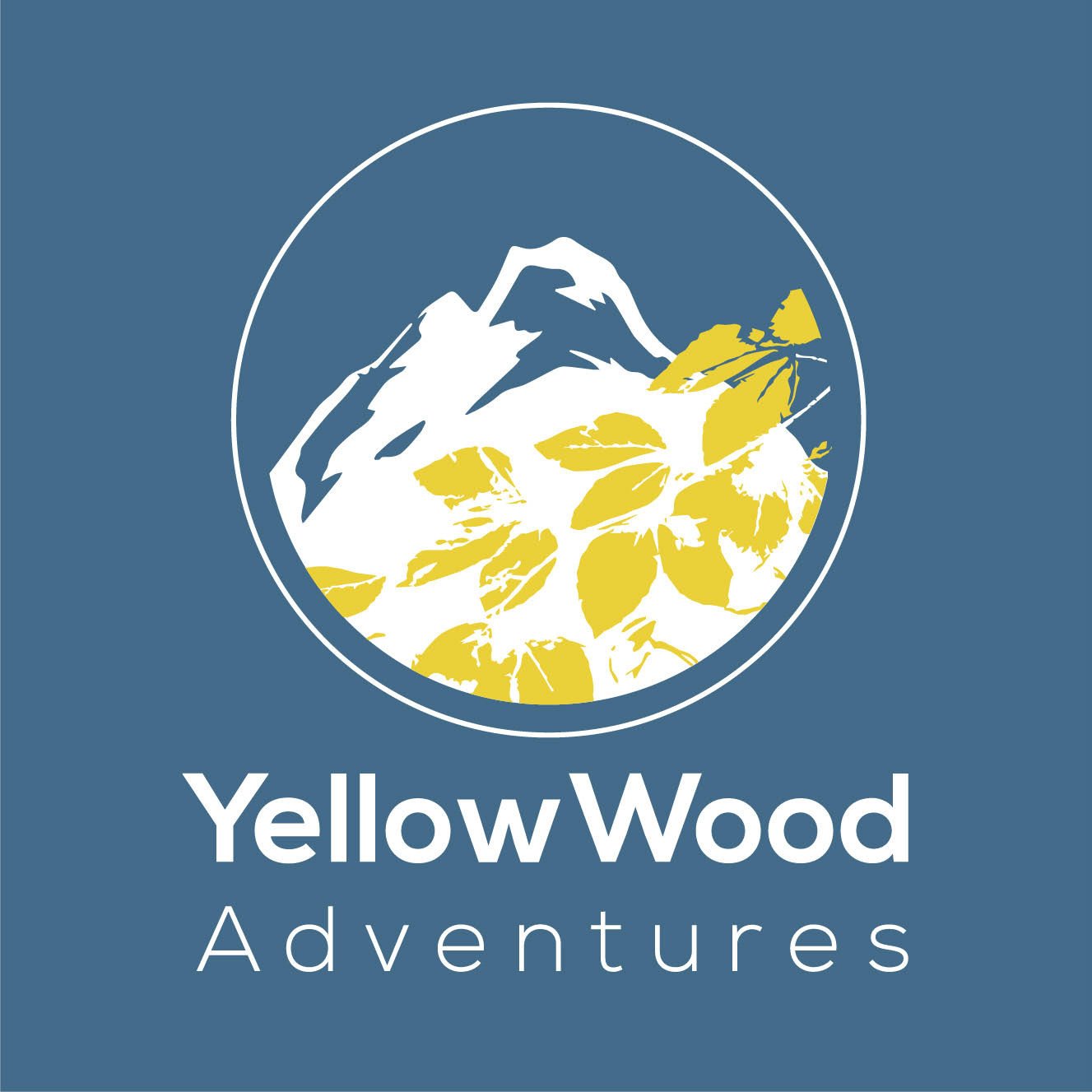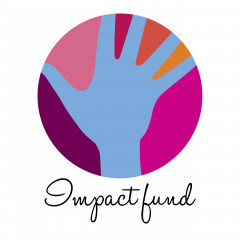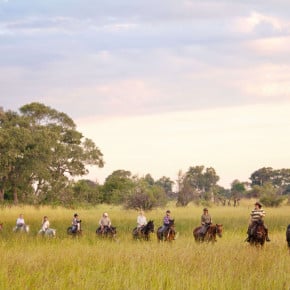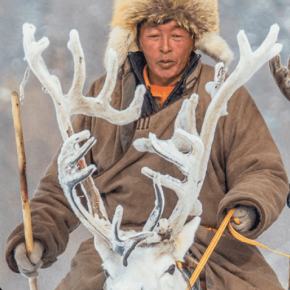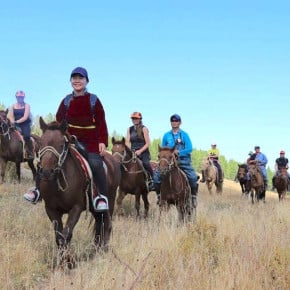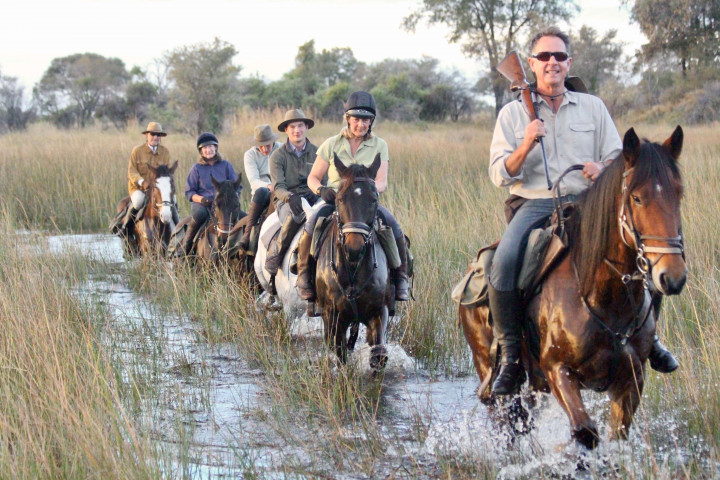
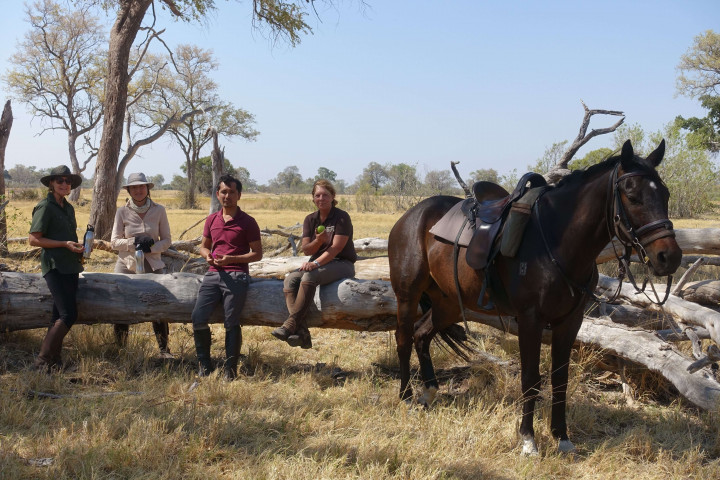
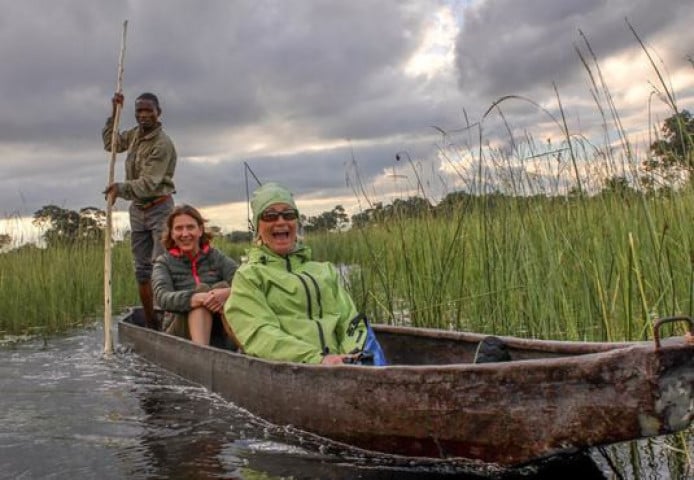
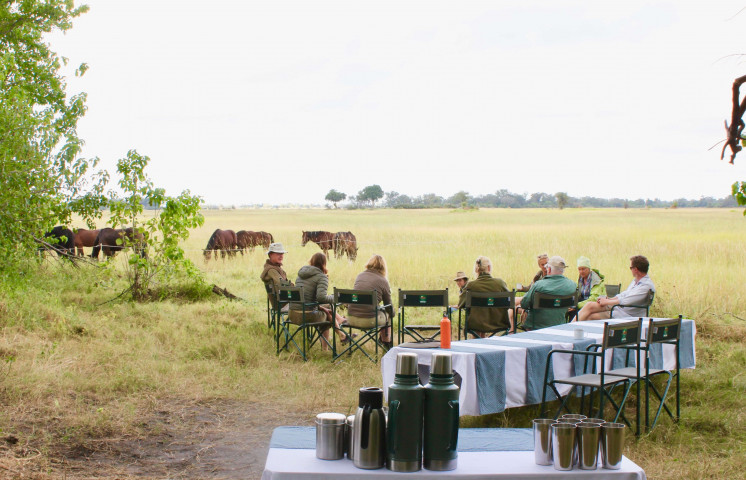
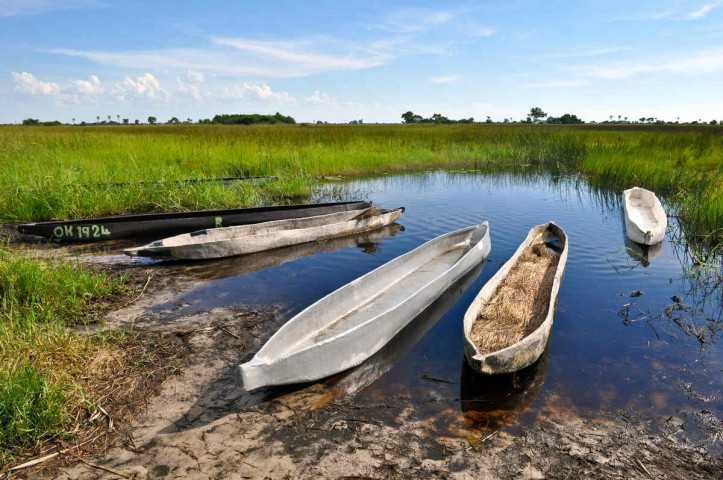
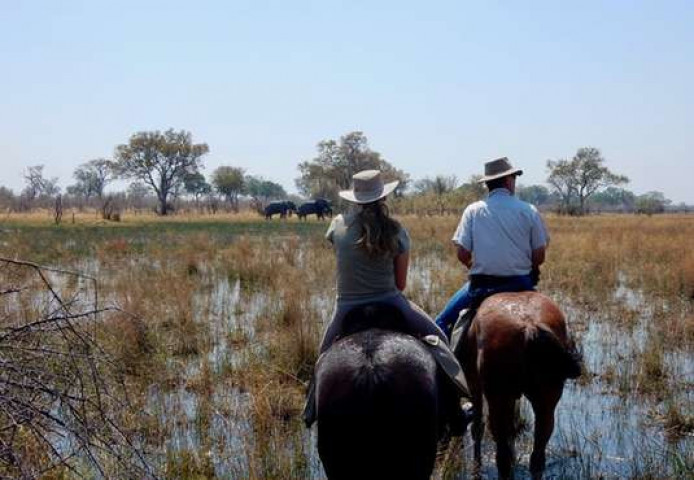
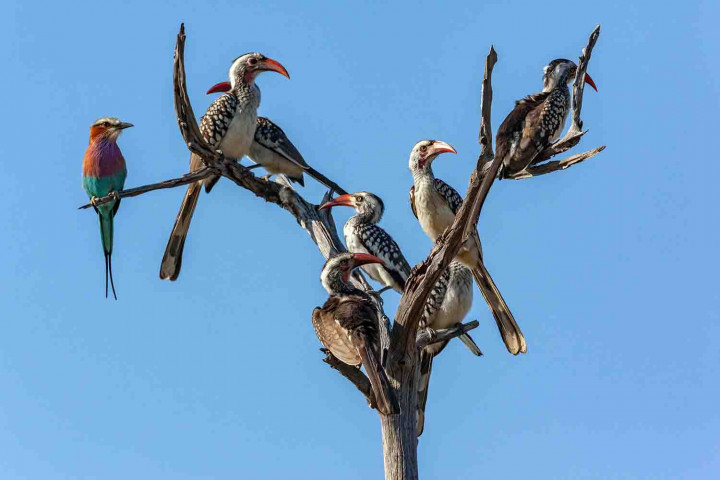
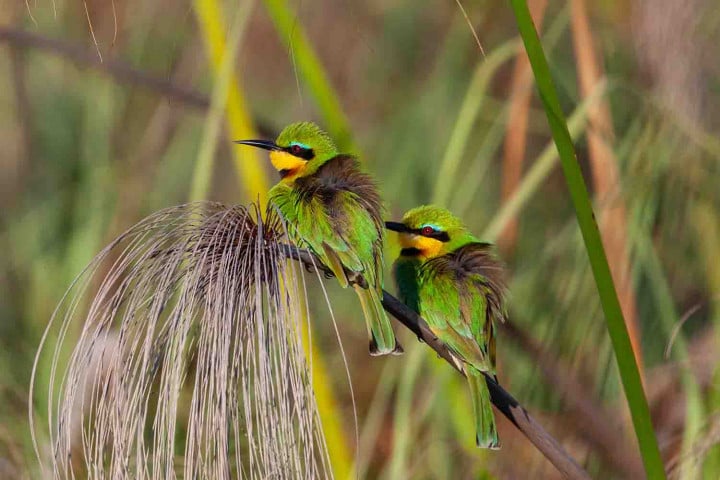
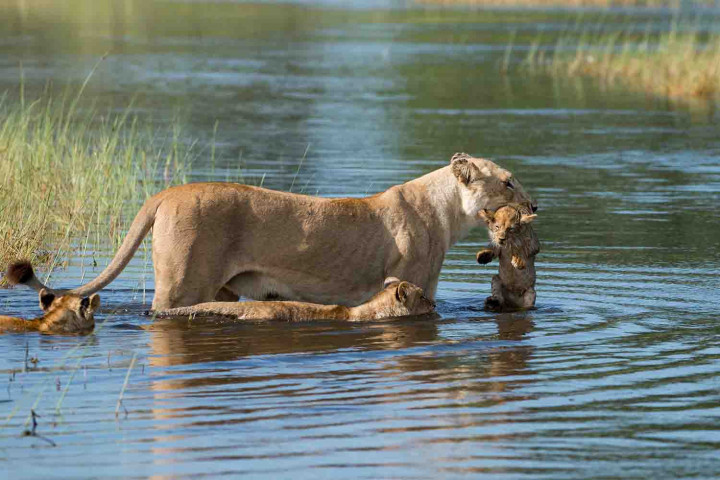
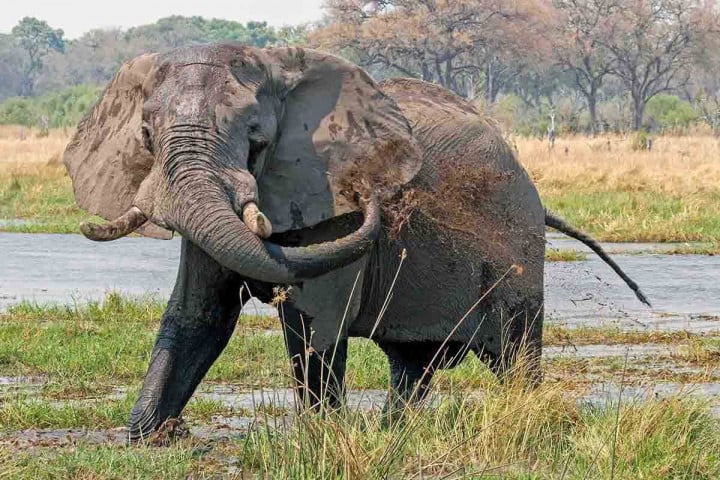
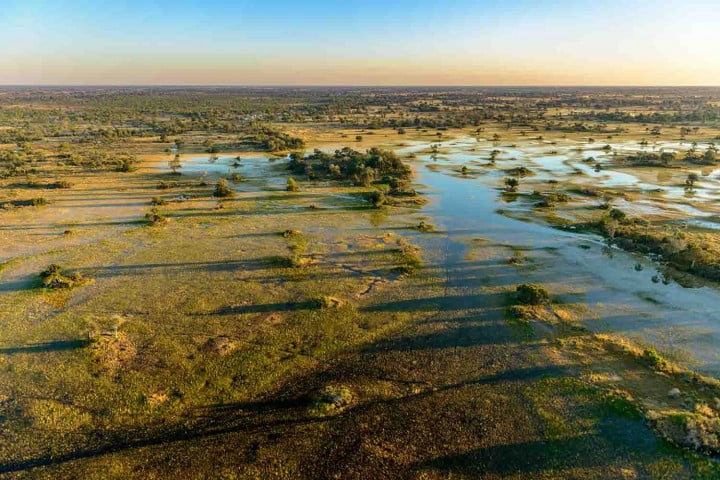
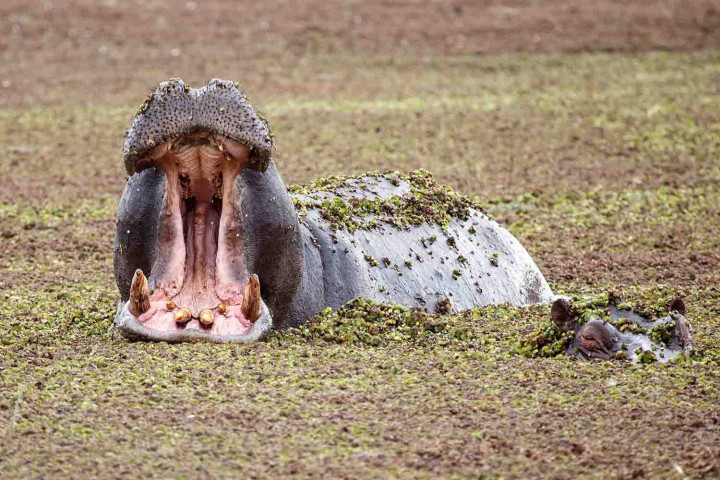
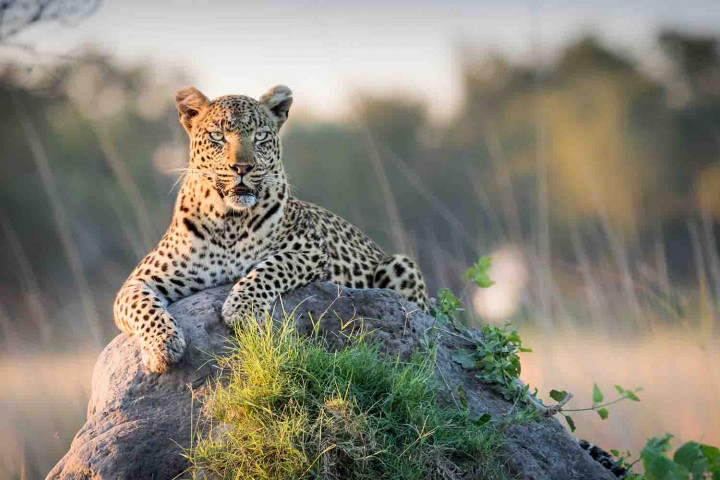
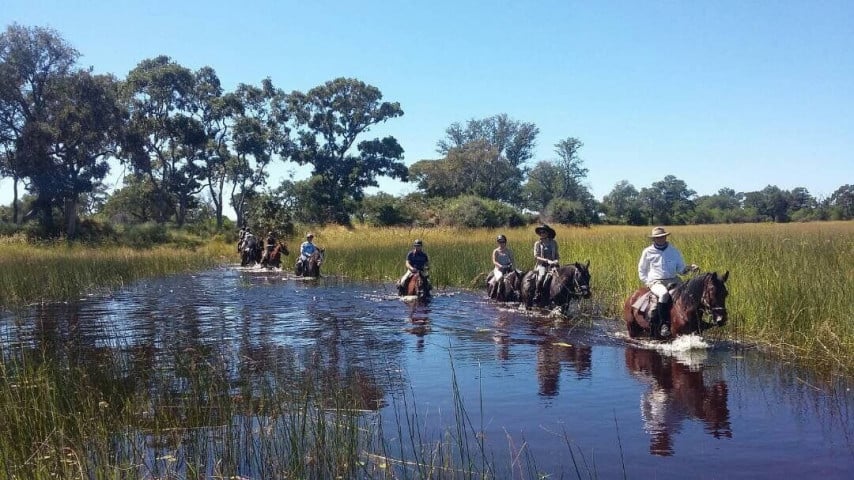
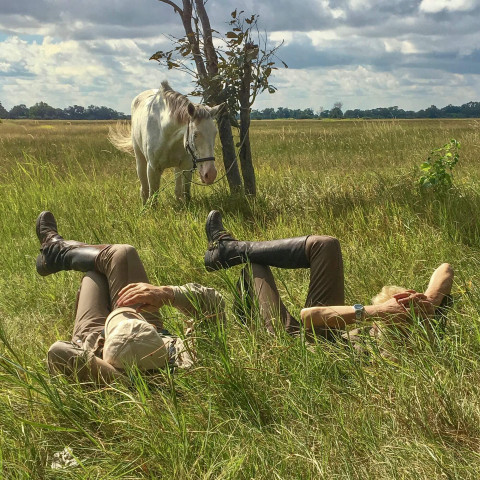
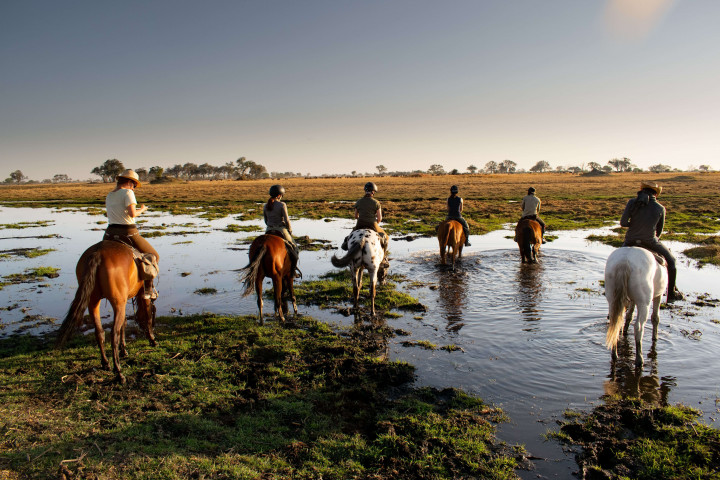
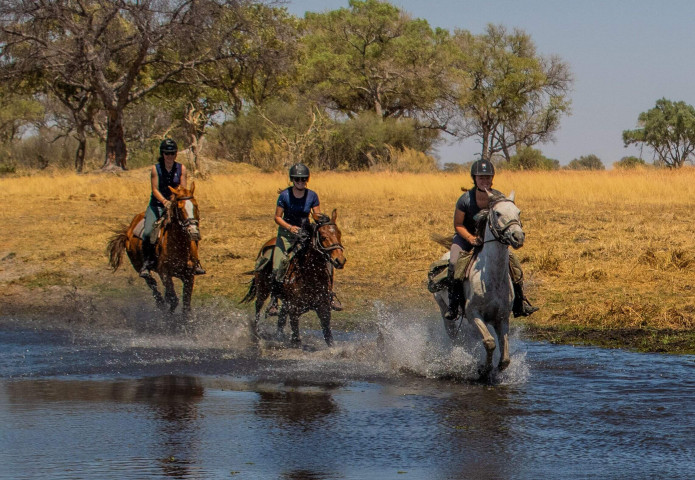
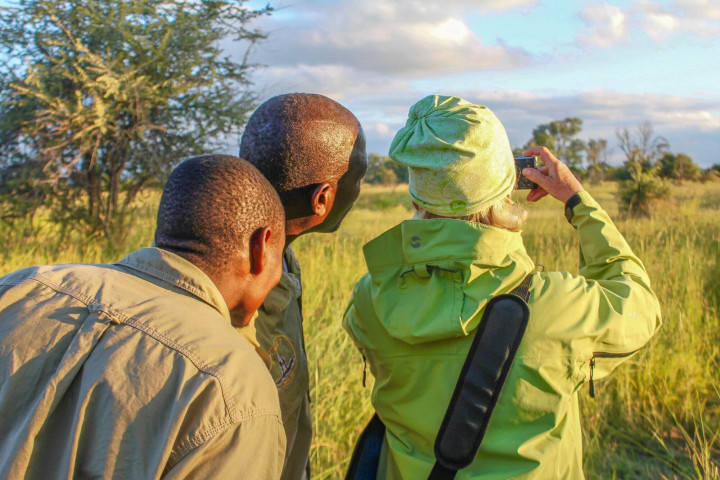
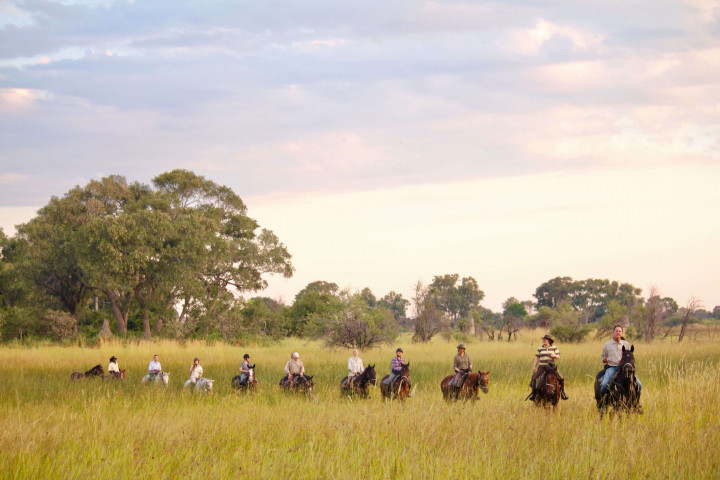
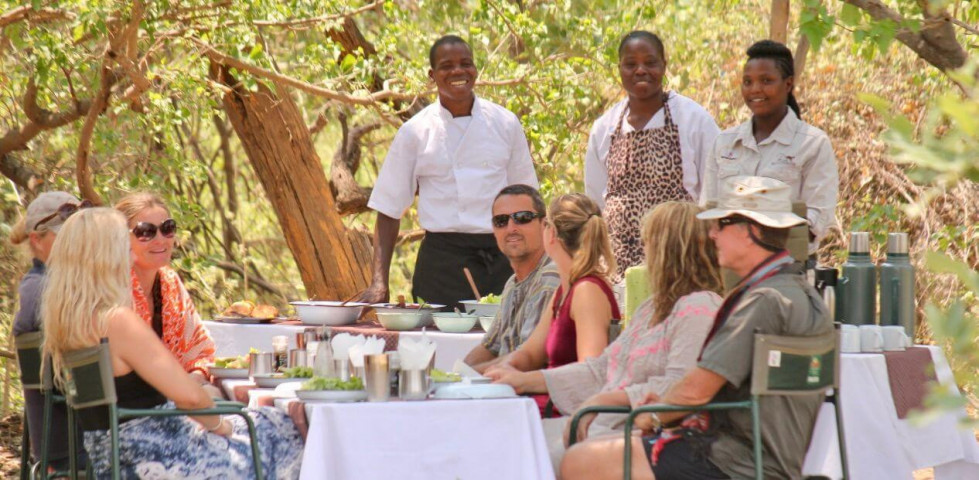




















- Overview
- Itinerary
- Esential info
- Packing list
Challenging
Activity
Transfers
7 Nights
5 - 5
Group size
Leaders
Discover Botswana's amazing wildlife in this Okavango Delta horse safari.
We can think of no better way to explore the stunning Okavango Delta than on a horse safari. Travelling responsibly and in a sustainable manner, you’ll have a truly unforgettable experience with your local tour guide. You’ll follow ancient elephant trails searching for a variety of wildlife, cantering through the recently flooded plains.
Recently declared the 1,000th World Heritage Site, the unique Okavango Delta is a horse rider’s Eden: as the floodwaters spread down into the Kalahari sands, the herds and birdlife follow, and horseback is the perfect place from which to observe them.
This Okavango Delta safari is unlike any other. Rather than a permanent riding camp, a lightweight mobile camp is transported by a flotilla of mekoros (traditional dugout canoes) poled by members of the local community, who live on the fringes of the Delta and know it intimately.
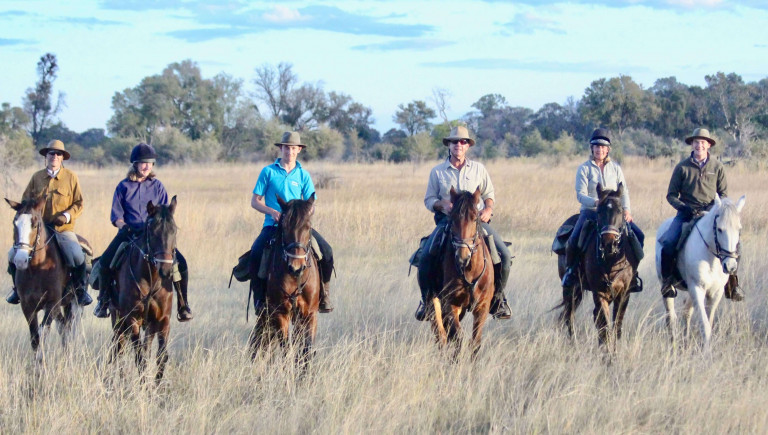
When the water levels are too low for the mekoros to navigate, a train of pack donkeys takes over. The emphasis is on the experience, the loveliness of the Okavango delta, and top-level guiding. The riding and the horses are unsurpassed, the wildlife is astonishing and the food (cooked over a log fire) is fabulous.
Our camp is extremely comfortable in lightweight tents with standing room, fully made up stretcher beds, bucket showers and short drop loos.
More departure dates may be available - please contact us for further information.
Day 1: Arrival
Transfer
Breakfast
Lunch
Dinner
Camping
Fly into Maun from Johannesburg or Cape Town on either Air Botswana or SA Airlink (SAA). There are daily flights by both airlines.
Guest will arrive at Maun and will be met by their guide or transfer driver where they will first be offered a light lunch and refreshments at the Jiko Airport Café where the guests can also change into their riding gear (so we suggest it is easily accessible out of their luggage). Once it has cooled down (approx. 3pm) the guests will be driven to the Xaraxao Buffalo Fence (approx. 35 min drive) on the edge of the Okavango Delta where the horses will tacked up and waiting. From here the guests will then take a short afternoon ride into camp. Your luggage will be loaded onto mokoros (local canoes) and transported there to meet you.
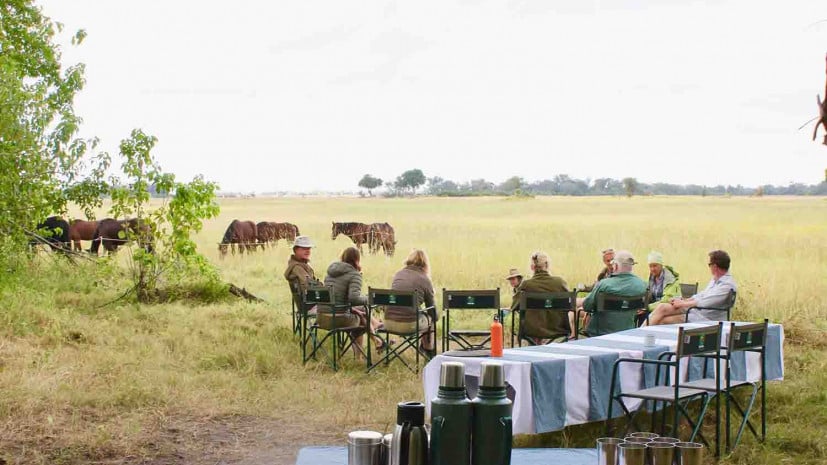
Day 2: Ride
Wildlife
Breakfast
Lunch
Dinner
Camping
There is no set itinerary, with the location of the camp dependent on water levels, wildlife movements and the length of the safari (the longer the safari the more likely the camp is to move). However every location is exquisite, there being a plentiful choice of shady tree-lined islands. A typical day starts with an early wake-up call and a light breakfast around the camp fire as dawn breaks. The morning is spent on horseback, following ancient elephant trails, searching for a variety of wildlife, enjoying the prolific birdlife, and cantering through the recently flooded plains.
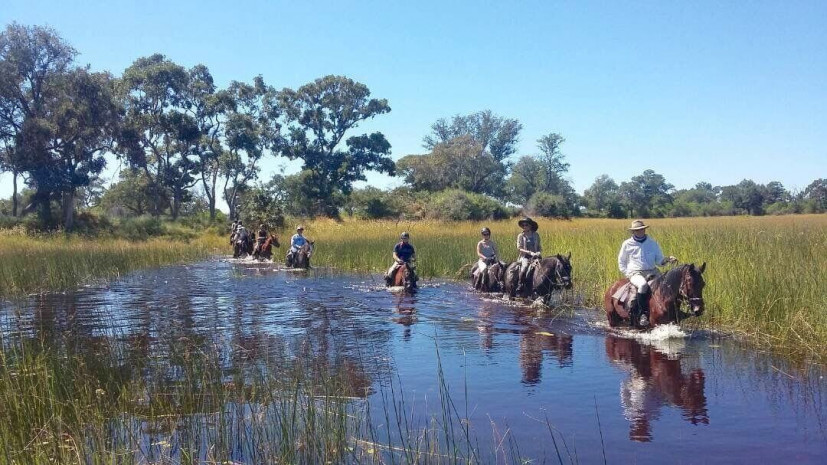
Day 3: Ride
Wildlife
Breakfast
Lunch
Dinner
Camping
Herds of buffalo may be in the vicinity, giraffes often saunter by and red lechwe splash through the water alongside, whilst kudu peer out from the thickets.
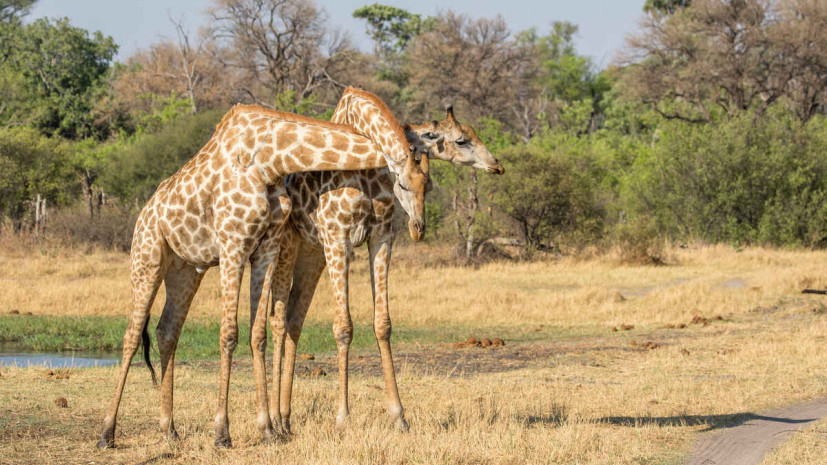
Day 4: Ride
Wildlife
Breakfast
Lunch
Dinner
Camping
No vehicles are involved, and this, along with our working in partnership with the local community, guarantees a genuinely environmentally-friendly safari. Exploring this water wilderness on horseback is absolutely exhilarating, in particular a first encounter with elephants – an experience very different from viewing them from a vehicle. Before the sun sets we ride into a secluded camp on a beautiful, remote island.

Day 5: Ride
Wildlife
Breakfast
Lunch
Dinner
Camping
We return to camp for lunch and siesta in the dense shade of the giant jackalberry or leadwood trees. A meditative evening ride is spent listening to the sounds of the bush and the snorting and splashing of the horses, before returning to camp for dinner under the stars.
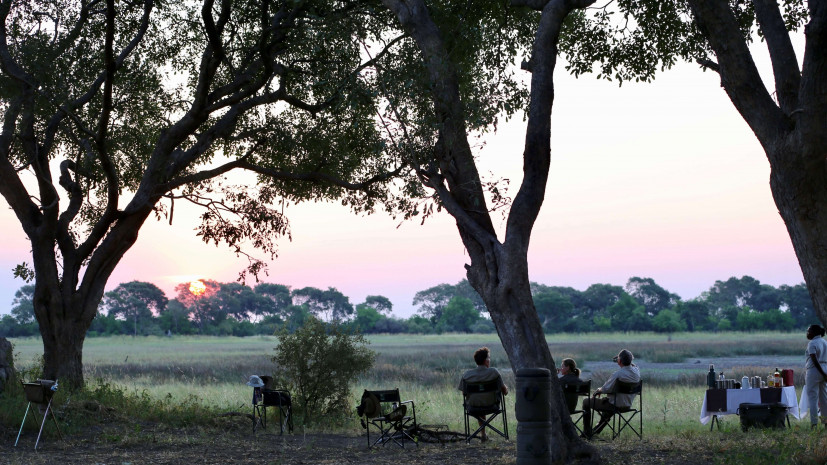
Day 6: Ride
Wildlife
Breakfast
Lunch
Dinner
Camping
Occasionally guests (and horses) may need to rest, which is the perfect opportunity for a tranquil ride in a mokoro, the traditional way of traversing the glittering, lily-lined lagoons and waterways. It is a chance too, to venture out on foot to appreciate the smaller creatures that inhabit the bush – or to learn some rudimentary tracking skills.
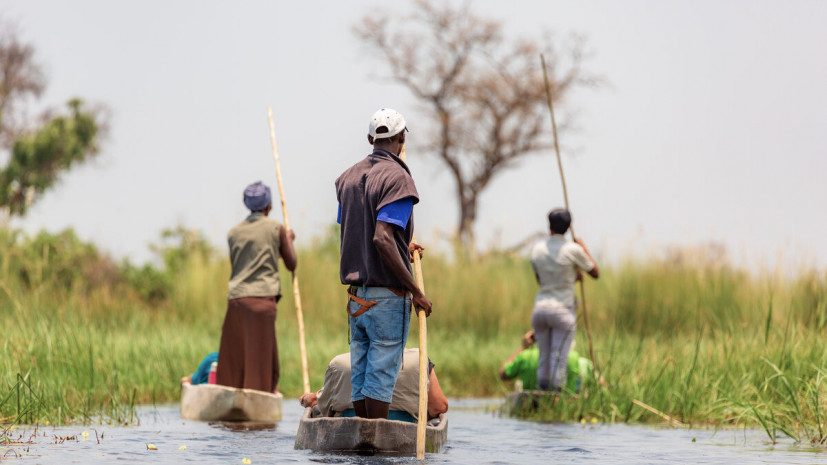
Day 7: Ride
Wildlife
Breakfast
Lunch
Dinner
Camping
No two days are the same, but every day is astonishing and joyous, and it is a privilege to share this unique and untouched wilderness with you.
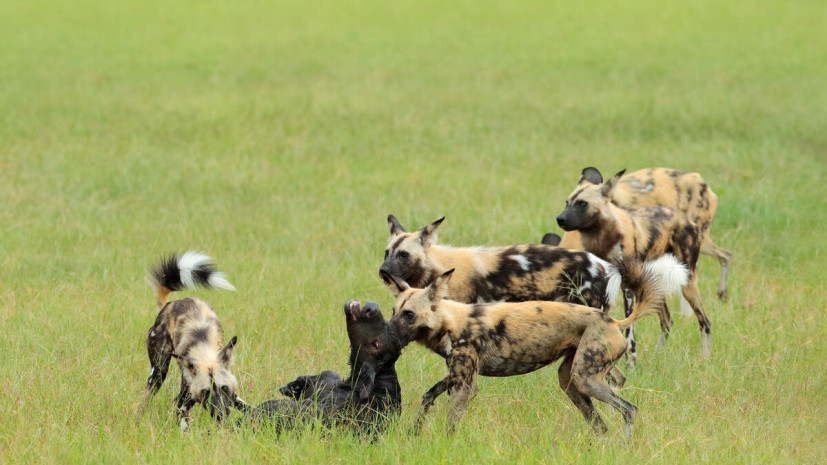
Day 8: Departure
Wildlife
Breakfast
Lunch
Camping
Departure day is a slightly later start with a cooked breakfast and a leisurely ride out of camp back to the Buffalo Fence where the transfer vehicle will meet the guests and drive them back to Maun for their onward journeys. Guests can once again change out of their riding gear at the Jiko Airport Café.
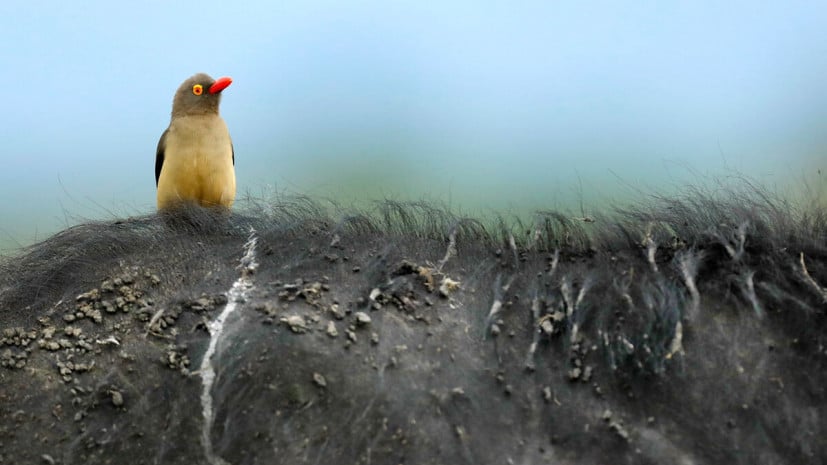
Adventure Optional Extras
Plant an additional 15 trees for your adventure
Carbon Compensation is not the perfect solution, and it is important to first reduce our carbon emissions as much as we can, yet trees remain an excellent natural technology to sequester carbon dioxide from the atmosphere to slow global warming.
For every client and guide who attends a YellowWood Adventure, we donate £30 to our partner charity WeForest to plant 15 trees to (over) compensate for the carbon footprint of the tour.
We also invite our clients to match this with an optional additional £30 for another 15 trees to be planted to help compensate for the carbon footprint of their international flights.
WeForest run many tree planting and tree maintenance projects such as this seedling nursery in the Amhara region of Ethiopia, the Amazon Rainforest in Brazil and many other projects in other countries including Zambia, Malawi, Tanzania & India.
Click Here to find out more about their amazing projects around the world.
Contents
The Area
The Okavango Delta:The Okavango Delta is one of the world’s largest inland river systems and one of its most incredible wildlife sanctuaries.Perhaps most remarkable of all, is that this 15,000km2 wetland paradise is located deep within the Kalahari Desert. Each year, an influx of water from Angola, 1000km to the north, floods into the Delta to create this natural miracle, a patchwork of river channels, lagoons, islands and floodplains. The area is a magnet for birds and animals and sustains a vast variety of fauna and flora, making it the ideal safari destination at any time of the year.
Horses, tack & riding experince
A suitable well cared for horse will be chosen from a stable of some 42 horses made up of cross breeds which include Shire/TB, Boerperd/TB, Friesian/BP,Arab crosses, Quarter horse crosses.They range in size from 14.1h to 16.2h.
All Rides:We use South African trail saddles. These are incredibly comfortable saddles and each one has specially designed holders to carry 2 water bottles per rider. Saddles bags can also be fitted to carry larger camera equipment, however for our Okavango Delta Ride we recommend a dry bag to carry it in
Okavango Delta Ride Guests must be competent at ALL paces (Walk, Trot, Canter and Gallop) and confident of keeping up with the pace of the group. You will be required to be riding fit and in good health in order to fully enjoy the experience of these safari options as long days (up to 6hours) can be spent in the saddle.
Weight & age limits
There is a maximum weight limit of 95kgs (in full riding gear) for each rider.Heavier experienced riders over this limit may be accepted but at the discretion of the company and may be required to pay for a 2nd horse to alternate on for the duration of the safari.A
Okavango Delta Riders must be over 12 years unless younger riders are extremely confident and competent and willing to spend long days in the saddle. All children should be accompanied by their parents /guardian. The company holds the right to decide whether younger riders may have to travel with an accompanying vehicle should they be unable to keep up with the group during the course of any safari.
Safety, hard hats, insurance & visas
All rides will be led by a professional experienced guide armed with a rifle. He will be accompanied by an assistant back up guide
Light weight riding helmets are compulsory for all children and for adults must be worn within the requirements of your insurance cover. Adults choosing to ride without helmets do so at their own risk and the company cannot beheld responsible for any injuries sustained as a result.
All riders must have full medical insurance cover–details of which they should carry with them on safari. It should cover horse riding as an activity as well as medical evacuation. Please check whether your insurance requires you to wear a riding helmet whilst on horseback. Each rider will be required to complete an indemnity form on arrival in camp during the safety briefing.
When entering Botswana each visitor is given an entry permit valid for the length of your stay.Please check before leaving your home country whether your nationality requires a visa. These are able to be purchased on arrival. Although there are no specific requirements with regard to vaccinations, each visitor should check with their local doctor at home and follow the advice accordingly.This should include anti malaria cover even thoughBotswana is a low risk area.
Climate, terrain & distance
Dry Season: Winter 16th April–31st October
Green Season: Summer 1st November–15th April
The Okavango Delta is formed by the Okavango river that flows into the Kalahari Desert where it reaches a tectonic trough creating a great inland wetland that supports a wide variety of wildlife. Besides being an oasis in the desert the Okavango, visible from space, is also one of Africa's greatest wilderness areas. The Okavango may well be a wetland but there are hundreds of islands that host a wide variety of wildlife. The islands are generally comprised of floodplains and woodland.
Between 4-7hours will be spent in the saddle each day. The longest days will be on the “move” days, when the camp is moved to a new location.
Accommodation
Less is more! The camp on our Okavango Delta Ride is 100% mobile comprising of simple but comfortable lightweight walk-in octagonal tents. There are traditional hot bucket showers and bush loos (1 of each shared between 2 tents).
In the Flood season (July–September) the camp is transported in to and between our different campsites using amekoro flotilla of up to 15 mekoros and the Walk-in tents are used throughout the safari and comprise of standard raised stretcher beds and comfortable bedrolls with linen and towels.
During the dryer months when the main channels have dried up we operate using pack donkeys. During the DonkeySafaris the camp set up changes slightly as we need to lighten the load for the donkeys. The octagonal walk-in tents are set up at a site which is used as a “base camp” and it is from here that we will make use of a “fly camp” smaller lightweight dome tents with low stretcher beds and comfortable bedrolls with linen and towels.
The same bathroom set up applies with 1 shower and loo for 2 tents. The fly camp is usually for 3 nights or less and all other camp facilities are the same.
Meals & drinks
We have a highly qualified chef on our safaris who produces simple yet delicious meals of a very high standard. The dining style is buffet using fresh ingredients and cooked over an open fire. Dinners are 2 courses comprising of a main meal and dessert. As we are very limited for space on these trips, dietary requirements should be confirmed prior to travel so that we may properly plan a specific menu to accommodate those requirements.
Water is a scarce resource in Botswana so please try to conserve it where possible.Drinking water is provided at alltimeson all our safaris and it is very important to stay hydrated.
As space is so limited on these safaris it really helps us to properly plan and pack for these trips for our guests to provide us with their specific drinks requests for both alcoholic and non-alcoholic drinks and where possible to include daily quantities. Drinking water, teas and coffees are provided. EG: Sally–“ Per Day: 2 x cokes, 2 Beers, 1-2 Gin n Tonics, Wine for Dinner”
Luggage & chargers
We kindly ask our guests to pack as light as possible and into soft bags not exceeding15kgs (including cameras and hand luggage)for this safari as space is limited. We also recommend waterproof bags if possible.Additional luggage can be left at the Ride Botswana offices in Maun of need be.
There are no charging facilities on this ride. We recommend guests bring with them a solar external battery bank to charge all camera equipment etc
Luggage is strictly limited to 15 kgs per person, including hand luggage. All luggage should be in soft bags and we highly recommend these are waterproof as they are carried on a Mekoro Flotilla in to the Okavango Delta or in the low flood season by Pack Donkey Additional bags can be stored, by arrangement, at the Ride Botswana Offices in Maun if need be.
You must bring:
• A lightweight riding hat
• A shade hat with strap
• Lightweight riding shoes (2 pairs)
• Sunglasses on string, riding gloves and bandana
• Bush colour riding clothes (not white):
• Jodhpurs or long trousers and chaps (2 pairs)
• Long sleeved cotton shirts
• Jersey, fleece or multi-pocketed waistcoat
• Light weight waterproof windbreaker jacket
• 4 x sets of socks and underwear (we recommend unpadded cycling shorts for men)
• Shorts, T shirts, sarong, swimwear and sandals
• Sun block, lip salve, insect repellent
• Head Torch (compulsory)
• Waterproof camera
• Solar Charging Bank (to charge camera equipment as there is no electricity on this safari)
• Binoculars
• A good book for lazy siestas
All clothing should be neutral coloured to blend in with the bush (shades of khaki, brown, beige or green) and light weight cottons are advisable. Please take into
consideration the time of year when you are travelling before making your final packing decisions. Many guests choose to wear their riding clothes and boots and carry wash bags in their hand luggage, in case bags are delayed or go astray on international flights.
Towels and other basic amenities are provided.
A first aid kit is available in camp but please make sure to bring any prescription medication with you. Please consult your doctor regarding anti-malarial advice and inoculations.
Compulsory
Need a little help?
All adventures can be tailored as private bespoke trips.
Please contact us for more information:
+44 207 846 0197
Related Adventures
September 2025 Tsaatan Tribe: The reindeer herders of Mongolia
Mongolia - Horse Riding
Embark on an extraordinary expedition to the heart of Mongolia and experience the nomadic lifestyle of the Tsaatan Tribe. Immerse yourself in the ancient art of reindeer herding and discover the unique cultural tapestry.
From
Booking Process
Select dates: Choose the dates for your adventure and consider adding any extra adventures or add-ons to enhance your experience.
Check the box to agree to our Terms & Conditions.
Make Booking: Click on "Make Booking." If you're booking more than 56 days before your adventure, you'll be redirected to secure WorldPay to make your deposit. If it's 56 days or less before your adventure, you'll need to make full payment. Rest assured, your money is held securely by the Association of Bonded Travel Organisers Trust.
Your booking will show as 'pending' in your YellowWood online account.
Confirmation: We'll be in touch as soon as possible to confirm your booking or discuss any availability limitations. Please refrain from booking transport or flights until we've emailed you to confirm your booking. (Note: Receipt of your booking form is not confirmation.)
Making payment: Once your booking is confirmed, we'll change the status of your final invoice from 'Pending Approval' to 'Outstanding,' indicating that it's ready for payment online.
You will receive a reminder email for your final payment 56 days before the departure date.
Feel free to contact us with any questions about your adventure or booking, we're here to help!
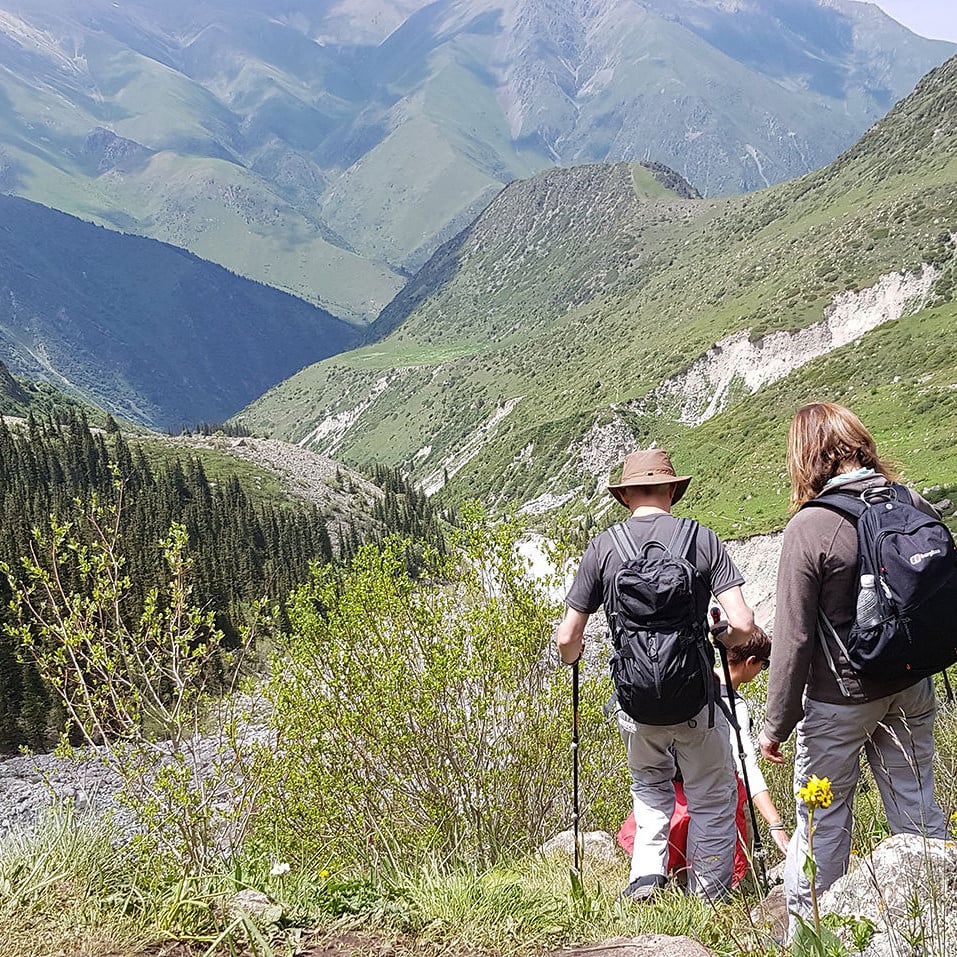
Grading
To help you choose the right adventure for you, we have given each itinerary a grading that relates to the level of Walking / Trekking you will experience during the trip. This grading can be found on the Yellow map on the adventure page of the website.
All of our trips involve a level of general activity so are designed for people who are in good health, enjoy the outdoors, and have a taste for adventure and some level of fitness. As will be clear from our destinations, the climate (and altitude) may be different to that which you are used to, so please take this into consideration when choosing the most suitable holiday.
Please read our Adventure Itinerary & Essential Information for more information and don't hesitate to contact us if you would like to chat through whether you have found a suitable adventure for you.
Grade 1-3: Entry Level
You need to be in good physical health to enjoy your active holiday, but you don’t need to be an experienced hiker. These itineraries offer a mix of sightseeing and easier walking for around 2-4hrs a day, with the emphasis on sights and cultural experiences.
Walks will be well marked or on defined pathways, and often around sites of interest. The expected amount of descent/ascent will depend on the landscapes of the destination, but will not exceed 400m/day, and will often be much less. Walks are at low altitude (below 3000m).
You will not be required to carry more than a day sack with water and essentials. Ensure you are aware of the weather conditions likely in the destination you are visiting and have a pair of comfortable and worn in walking shoes/boots.
Grades 4-6: Intermediate
You need to have a good level of fitness and be a regular walker for these adventures, with ideally some trekking experience. You can expect to be walking for 3-6 hours per day, not including rest stops, normally on good trail paths but with some uneven surfaces at times.
You will not be required to carry more than a day sack. You may be walking in more challenging temperatures. You will generally be walking at low altitude (below 3000m) but may walk at altitudes up to 4000m. The amount of ascent could be up to 800m in a day but will frequently be less. You may walk on consecutive days.
Ensure you are aware of the weather conditions likely in the destination you are visiting and have suitable clothing for this adventure.
Grades 7-9: Challenging
You need to have a good level of fitness with previous experience of trekking. Extra training before your trip will ensure that you get the most out of your adventure. Areas will be remote and terrain uneven.
Expect to walk for 5 – 8 hours a day, not including breaks, with some very steep ascents and descents. You will be walking at altitude (over 3000m but not higher than 5000m).
Ensure you are aware of the weather conditions likely in the destination you are visiting and have suitable equipment/clothing for this adventure (see the packing list for your adventure).
Please check individual itineraries for details of what you will need to be carrying with you.
Get in touch
CLICK HERE to schedule a call online with YellowWood Founder Sam McManus.
Or call us directly 24/7 on:
